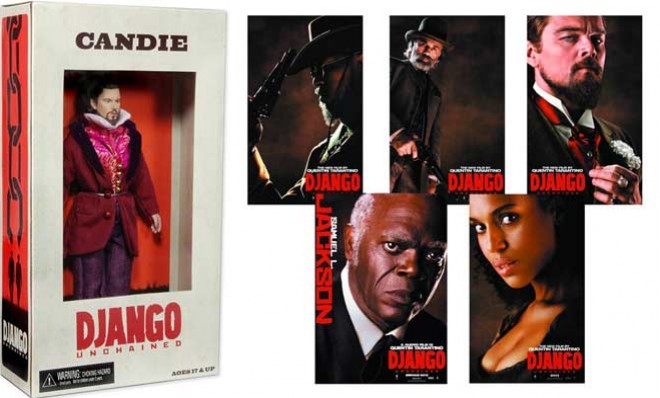The Django Unchained action figures: Over the line?
Critics say the dolls make a mockery of slavery


A free daily email with the biggest news stories of the day – and the best features from TheWeek.com
You are now subscribed
Your newsletter sign-up was successful
There is seemingly no aspect of Django Unchained, Quentin Tarantino's vengeance fantasy set in the pre-Civil War South, that hasn't divided critics. Is it "the best movie about slavery, ever"? Or is the film's irreverent, ahistorical take on the peculiar institution proof that "for Tarantino, history is just another movie to strip for parts?" Is Samuel Jackson's character Stephen, a "house nigger" who helps oppress his fellow slaves, a testament to the "profound psychological suffering slavery produced"? Or an example of "a white director hold[ing] an obsequious black slave up for ridicule?"
With news today that all the black actors in Django Unchained were snubbed by the Academy Awards — even while the film racked up nominations for best picture, best supporting actor (Christoph Waltz), and best original screenplay — the controversy over the movie's racial politics is certain to continue. And just in time to stoke the flame is the introduction of a new line of action figures based on the movie — including the gun-slinging hero Django, "house nigger" Stephen, slave-master Candie, and bounty hunter (and abolitionist) Dr. King Schultz. The toys were developed by the National Entertainment Collectibles Association, which reportedly consulted with the producer of Django Unchained, the Weinstein Company.
The criticism has been swift. "Selling this doll is highly offensive to our ancestors and the African-American community," said Reverend K.W. Tulloss, an official with Al Sharpton's National Action Network. "The movie is for adults, but these are action figures that appeal to children. We don't want other individuals to utilize them for their entertainment, to make a mockery of slavery."
The Week
Escape your echo chamber. Get the facts behind the news, plus analysis from multiple perspectives.

Sign up for The Week's Free Newsletters
From our morning news briefing to a weekly Good News Newsletter, get the best of The Week delivered directly to your inbox.
From our morning news briefing to a weekly Good News Newsletter, get the best of The Week delivered directly to your inbox.
One reviewer on Amazon, where the figures are sold, wrote, "I have to say, I never in my wildest dreams would I have imagined that, unlike myself, my kids would someday have the opportunity to re-enact America's slave trade the way my great-grandfather did! How exciting for them! Never mind those silly dolls showing racial equality and putting "black Americans" (hah! is that the word we want to really use here?) in a positive light — no! With this, my kids can experience first-hand what it might have been like to own their very own slave!"
Amy Alexander, writing at The Root, says the figures could discredit the movie: "At the very least, it is in poor taste, considering the fact that the bondage of blacks is the main theme of the story. It does make you wonder who officially 'green-lit' such a dubious and insulting marketing strategy. And correctly or not, it feeds the escalating criticism of Tarantino as an out of control hipster who thinks he gets 'the Black Thing' but doesn't really."
The target audience for the figures are, of course, adults, not children. Characters from Tarantino's past movies, including Nazis, have also been turned into action figures. And they're not even meant be played with — anyone who has watched The 40-Year-Old Virgin knows that's not how movie geeks treat their collectibles. "They're made to be kept penned up in boxes, where you can look upon them every day and feel like a big man," says Sean O'Neal at The A.V. Club.
Still, public support for the figures appears understandably thin.
A free daily email with the biggest news stories of the day – and the best features from TheWeek.com
Ryu Spaeth is deputy editor at TheWeek.com. Follow him on Twitter.
-
 The EU’s war on fast fashion
The EU’s war on fast fashionIn the Spotlight Bloc launches investigation into Shein over sale of weapons and ‘childlike’ sex dolls, alongside efforts to tax e-commerce giants and combat textile waste
-
 How to Get to Heaven from Belfast: a ‘highly entertaining ride’
How to Get to Heaven from Belfast: a ‘highly entertaining ride’The Week Recommends Mystery-comedy from the creator of Derry Girls should be ‘your new binge-watch’
-
 The 8 best TV shows of the 1960s
The 8 best TV shows of the 1960sThe standout shows of this decade take viewers from outer space to the Wild West